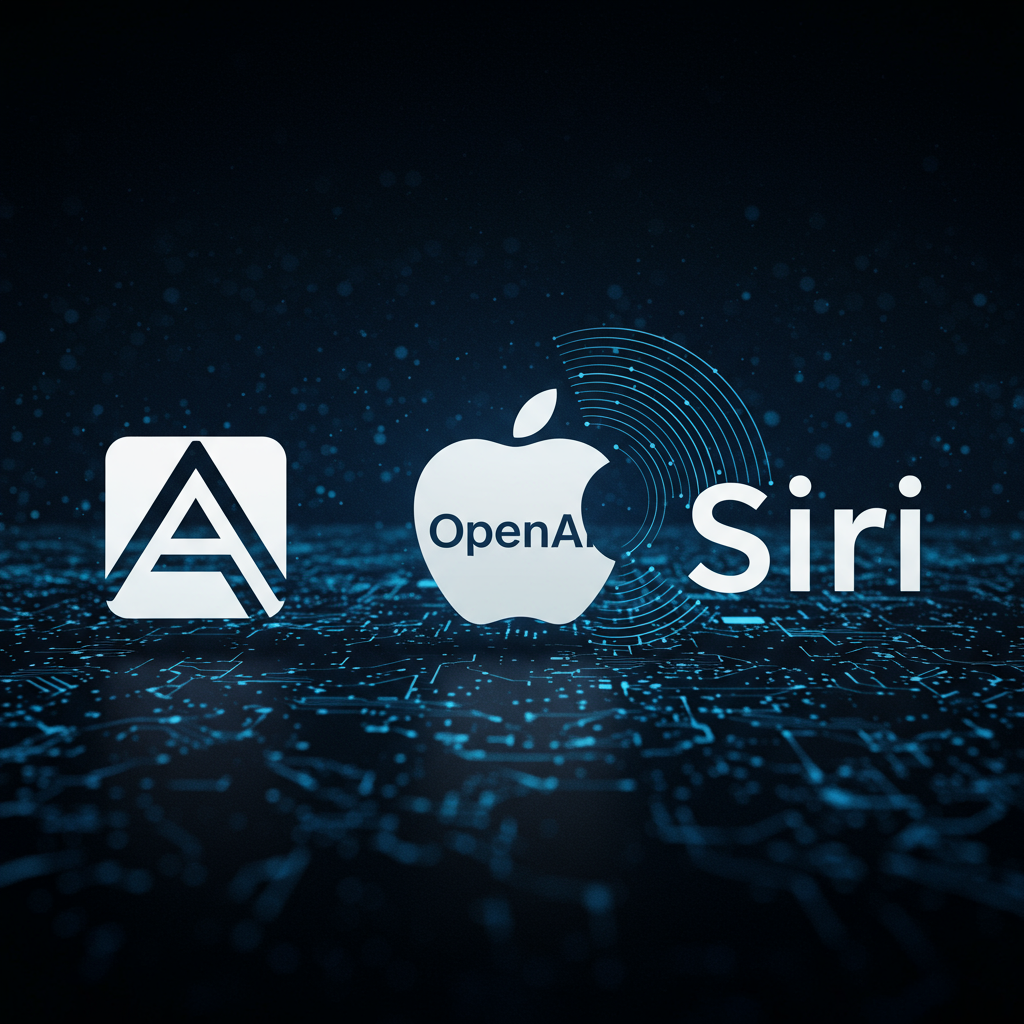apple Inc. is reportedly exploring a monumental shift in the core technology powering its virtual assistant, Siri. Rather than solely relying on its internal artificial intelligence models, the iPhone giant is said to be in discussions with leading AI labs, including Anthropic PBC and OpenAI. This potential move could signal a major strategic reversal, aiming to revitalize Siri’s capabilities and address perceived shortcomings in apple’s own AI development progress.
Sources familiar with the confidential deliberations have indicated that Apple has engaged with both Anthropic and OpenAI. These conversations reportedly involve the possibility of leveraging their advanced large language models (LLMs) for a forthcoming iteration of Siri. A key aspect of these discussions involves Apple requesting that the external AI companies train versions of their models specifically for deployment and testing within Apple’s private cloud infrastructure.
Exploring External AI Power for Siri
The exploration of third-party AI models marks a potentially significant departure from Apple’s historical approach, which has heavily favored in-house technology development. For years, Siri has been powered by Apple’s proprietary AI, but it has often faced criticism for lagging behind competitors in understanding complex queries and providing natural, helpful responses. This strategic shift could be a direct response to those challenges and the accelerating pace of AI innovation across the tech landscape.
The move is described by insiders as a potential “major reversal” and is seen as an effort to address what has been characterized as Apple’s “flailing AI effort” by some reports. Integrating cutting-edge models from companies at the forefront of AI research like Anthropic or OpenAI could provide a much-needed injection of advanced capabilities into Siri, helping it better compete with voice assistants and AI features offered by rivals such as Google and Amazon.
Why Consider Outside Models Now?
Several factors likely contribute to Apple’s consideration of external LLMs for Siri. One primary driver appears to be the desire to accelerate the development of a more capable voice assistant. Earlier this year, Apple reportedly delayed significant planned AI improvements for Siri until 2026, highlighting potential internal hurdles in achieving its AI ambitions on schedule. Leveraging proven, advanced models from external partners could potentially bridge this gap and bring enhanced features to users faster.
Furthermore, the competitive landscape in artificial intelligence is intensifying rapidly. Companies like Google have deeply integrated advanced LLMs like Gemini into their products, offering users conversational AI experiences that Siri has struggled to match. Microsoft has similarly integrated OpenAI’s technology across its ecosystem with Copilot. For Apple to remain competitive in the age of generative AI, a significant upgrade to Siri’s underlying intelligence seems increasingly necessary.
Another potential factor could be resource allocation. Developing state-of-the-art LLMs requires massive computational power, data sets, and specialized talent. While Apple has significant resources, partnering with companies already specializing in this specific area could allow Apple to focus its internal AI efforts on other critical areas, such as on-device processing, privacy-preserving AI techniques, and integrating AI seamlessly across its hardware and software ecosystem.
Inside Apple’s AI Strategy and Challenges
Recent reports have shed light on internal shifts within Apple’s AI division, suggesting a push to accelerate progress. According to one Bloomberg report from March, Apple reorganized leadership overseeing AI initiatives. Mike Rockwell, previously known for overseeing augmented reality efforts, reportedly took charge of Siri development. This change was framed as potentially indicating CEO Tim Cook’s desire for faster execution on product development timelines within the AI space.
Despite considering external partnerships for Siri’s core AI, Apple has also publicly showcased its commitment to developing its own AI capabilities. At the recent Worldwide Developers Conference (WWDC), Apple demonstrated several new AI features designed to enhance user experiences, many of which are processed on-device to protect privacy. Examples included real-time call translations and improved photo editing tools.
Software chief Craig Federighi also made statements at WWDC indicating a degree of increasing openness in certain AI areas. He mentioned plans to make Apple’s foundational AI model, used for some built-in features, accessible to third-party developers. Federighi also noted that Apple’s key developer software would offer users a choice between Apple’s own code completion tools and those provided by OpenAI, suggesting a willingness to collaborate in specific contexts.
Potential Implications and Considerations
Should Apple proceed with integrating an external LLM into Siri, the implications would be far-reaching. For users, it could mean a vastly more intelligent and versatile Siri capable of handling more complex requests, engaging in more natural conversations, and providing more accurate and context-aware information.
For Apple, it would represent a strategic pivot, acknowledging the potential benefits of leveraging external expertise in specific, rapidly evolving technology areas. However, it would also raise important considerations around data privacy, security, and ensuring the external models align with Apple’s strict standards and user experience philosophy. The financial implications of licensing such advanced technology would also be significant.
For Anthropic and OpenAI, securing a partnership with Apple for Siri would be a massive endorsement and a significant business opportunity, cementing their positions as leaders in the commercial application of large language models.
The reports indicate that discussions are still in their early stages, and no definitive decision has been made. Apple, Anthropic, and OpenAI representatives have reportedly declined to comment publicly on the potential partnership, which is common practice for companies engaged in sensitive strategic talks. Regardless of the outcome, the fact that Apple is even considering such a move underscores the intense pressure to advance its AI capabilities and highlights the transformative power of today’s leading large language models.
Frequently Asked Questions
Why is Apple reportedly considering using outside AI models for Siri?
Reports suggest Apple is considering external AI models from companies like Anthropic or OpenAI primarily to address perceived weaknesses and delays in its own Siri AI development. Integrating advanced large language models (LLMs) could help Apple accelerate improvements, enhance Siri’s conversational abilities, and better compete with AI offerings from rival tech companies.
Which companies is Apple reportedly in talks with for Siri’s AI?
According to Bloomberg News reports, Apple is reportedly in discussions with two prominent artificial intelligence companies: Anthropic PBC and OpenAI. These talks involve the potential use of their respective large language models (LLMs) to power future versions of the Siri voice assistant.
What could using external AI models mean for Siri’s future capabilities?
Integrating advanced external LLMs could significantly enhance Siri’s capabilities. Users might experience a more intelligent assistant capable of understanding complex commands, engaging in more natural conversations, and providing more helpful and relevant information, potentially closing the gap with other leading AI systems.
The reported discussions, while preliminary, underscore Apple’s commitment to evolving Siri and navigating the rapidly changing landscape of artificial intelligence. The potential integration of cutting-edge LLMs could be a crucial step in ensuring Siri remains a relevant and powerful tool for Apple users worldwide.




